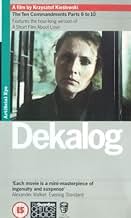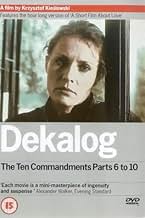Dekalog, szesc
- Episódio foi ao ar 8 de jun. de 1990
- TV-MA
- 58 min
AVALIAÇÃO DA IMDb
8,6/10
4,8 mil
SUA AVALIAÇÃO
Adicionar um enredo no seu idiomaA teenager spies on his older neighbour through binoculars.A teenager spies on his older neighbour through binoculars.A teenager spies on his older neighbour through binoculars.
- Direção
- Roteiristas
- Artistas
Hanna Chojnacka
- Miroslawa
- (não creditado)
Krzysztof Koperski
- Gasman in Magda's Apartment
- (não creditado)
Jaroslawa Michalewska
- Post-Office Clerk
- (não creditado)
Emilia Ziólkowska
- Old Woman at Post-Office
- (não creditado)
- Direção
- Roteiristas
- Elenco e equipe completos
- Produção, bilheteria e muito mais no IMDbPro
Avaliações em destaque
His Tomek , for long time, was , in the case of me, almost a memory about a personal experience. From the serie of "it could be". Because he gives the entire map of an existence looking for the truth of him in the most personal manner. The honesty of Tomek is the source of the strange atmosphere and powerful message. The love with its so many nuances. The sincere need of the other. The fascination and ingenuity and the life who is, in some measure, part of yours. And the end. Sure, a short version of a known Kieslowski film. But, maybe, more personal. Or seductive. Or fascinating.
In most of the films the treatment of love leaves a lot to be desired. This might be because it is always a challenge to effectively portray true feelings of love which might appeal to all kinds of viewers. This is the reason why an occult theme such as love should always be shown by taking into consideration concomitant themes such as desire, lust,sexuality and voyeurism.These sentiments are some of love's near cousins.This can help in making love stand apart from other secondary feelings."Dekalog:Dekalog,Szesc (#1.6)" is an excellent short film which gives us an idea about true love.Polish director Krzysztof Kieslowski shows us how true love comes and makes sense in the life of a person for whom love means nothing.The puzzling thing is that this is a case of an unusual love story involving a young boy and a woman who is older than her.This theme might appear as a bit hackneyed due to the fact that a lot of elements have been copied from American cinema but nevertheless the overall content of the film is original.A great film for all those who believe that love can only be felt and cannot be shown.
10Hitchcoc
This is a captivating film. A young man is totally taken with an older woman who lives in an apartment across from him. He uses a little telescopic device to spy on her. He has fallen in love and bumbles around, carelessly finding ways to engage with her. He is very young and careless. Eventually he spills his guts to her. He has watched her for a year and knows so much about her. She is, herself, an angry, lonely person, who sees love as baseless and manipulative. Her original motivation is to gain his affection only to stomp on his heart. But things aren't that simple and she makes a near disastrous mistake. In the end we are left to guess a bit, but the film is highly satisfying.
Cat-and-mouse game of voyeur and victim, with an exchange of roles between the two about halfway through. Seems to have been well-received by the critics, but I found it too coy and contrived, not to mention compromised by a lack of credibility: The supposedly naive pure idealistic love of the voyeur, a 19 year-old boy, fails to acknowledge the inherent ugliness of voyeurism. Voyeurism entails a sinister imbalance of power between watcher and watched; it consists of cruelty and exploitation more than love; all of which the woman seemed to overlook much too easily. If the boy truly loved her, he would have stopped stalking her; his isn't love, but disease. The whole affair is intellectual structuralism at its worst, a plot concocted to demonstrate a point. Apparently, the woman spied upon "adulterates" the boy's love by humiliating him, as well as being unfaithful to her lover and unfaithful to love itself by her cynicism (thus violating the commandment, though unmarried). Her repentance and reversal seems as sudden and arbitrary as everything else in the film. Silly color coding abounds; the stranger in white (angel of death?) here carries a suitcase and shopping bag. The only intriguing element for me was the surrogate mother's sexual possessiveness, a tickle of evil.
Once again Kieslowski manages to produce a compelling and thought provoking film. This time seemingly constructing his plot from the best parts of "Rear Window" and "Lolita". Kieslowski presents his characters simply as they are, free of prologues, backgrounds, flashbacks or exposition and does not "ask" us to identify with the obsessive voyeur or the subject of his gaze but "presents" them to us as subjects to observe. Inevitably Kieslowski's choices pay off as we begin to empathize with these characters not necessarily because he wants us to but because they're needs and desires are too similar to ours for us to simply look at them in disgust. Episode 6 presents us with two characters who begin on opposite sides of the emotional spectrum and end up reversed just as their voyeuristic tendencies do. There is never any chastising from one character to another which some have called unrealistic or contrived. For me however this rings truer than the most moralizing of speeches because both characters know they're in no position to judge the other. They're both aware of their faults and willingly pay for them (witness Magda's indifference to her own suffering and Tomek's voluntary repentance courtesy of Magda's lover (ala "Raging Bull"). To those who would call such a tale unrealistic I say go watch "Pretty Woman" again.
Você sabia?
- CuriosidadesThis episode extended and released as the feature length movie "A Short Film About Love" (1988).
- ConexõesEdited from Não Amarás (1988)
Principais escolhas
Faça login para avaliar e ver a lista de recomendações personalizadas
Detalhes
Contribua para esta página
Sugerir uma alteração ou adicionar conteúdo ausente

















